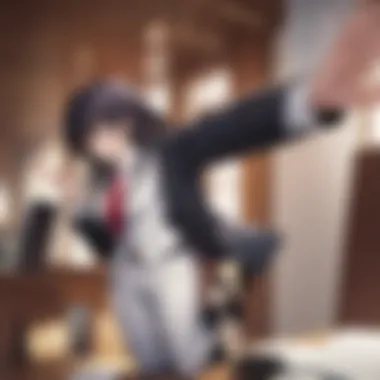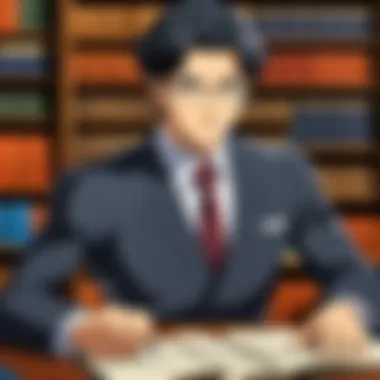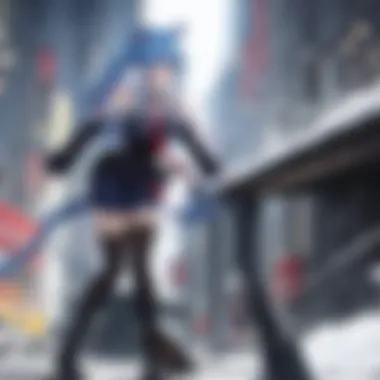The Role of Anime Lawyers: Bridging Fiction and Legal Realities


Intro
Anime, a medium rich in storytelling and vibrant visuals, often incorporates various professions into its narratives. Among these, the portrayal of lawyers stands out as particularly significant. This article will delve into the representation of lawyers in anime, examining how these characters not only reflect legal complexities but also mirror societal attitudes towards justice and ethics. By exploring key series and their notable characters, we aim to reveal the intricate connections between fiction and the legal world.
Series Overview
Synopsis and Premise
Lawyers in anime often serve as symbols of justice, moral dilemmas, and societal critique. Series like Ace Attorney and Lawyer Sumo present unique storylines where characters navigate through intense legal battles. The premise across these shows typically pits lawyers against formidable foes, showcasing the intricacies of the legal system while highlighting personal struggles.
Notable Characters
Some of the most compelling anime lawyers include Phoenix Wright from Ace Attorney, who is known for his unyielding quest for justice despite overwhelming odds, and Ryoma Sakamoto from Mushibugyô, who exhibits a more traditional representation of a legal advocate. The character arcs in these series not only serve to entertain but also challenge the audience to think critically about the morality of legal practice.
Themes and Motifs
Major Themes Explored
The themes surrounding anime lawyers are multifaceted. Common themes include:
- Justice vs. Injustice: The constant battle between right and wrong plays a central role.
- Ethics of Law: Characters often grapple with ethical dilemmas, as their roles as advocates can conflict with personal beliefs.
- Societal Reflections: These narratives typically serve as commentary on real-life legal issues, mirroring public sentiments towards law enforcement and justice.
Symbolism in Storytelling
Symbolism in anime often serves to deepen the audience’s understanding of legal complexities. For instance, courtroom settings frequently symbolize the struggle between societal norms and individuality. The use of color and sound during courtroom battles can also evoke emotions, reflecting the tension present in legal proceedings.
Artistic Style and Animation
Visual Aesthetics and Design
The artistic style in legal anime ranges from hyper-realistic settings to stylized character designs. Series like Guilty Crown employ a more abstract art style to emphasize emotional conflicts, while Ace Attorney maintains a more comic-like appearance, making legal battles less intimidating to viewers. The choice of aesthetics can significantly influence the viewer's perceptions of the legal scenarios presented.
Animation Techniques and Trends
Animation plays a crucial role in conveying the intensity of courtroom scenes. Techniques such as dynamic camera angles, rapid cuts, and slow-motion enhancements create a sense of urgency and drama. These choices not only serve to engage viewers but also highlight the high stakes involved in legal battles, making the portrayals more gripping and relatable.
"The blending of anime narratives with legal drama offers a unique lens through which to understand the complexities of justice and morality."
As we continue to explore these elements, it becomes clear that anime does not merely display legal battles; it invites audiences to engage with deeper questions regarding ethics, societal norms, and the essence of justice itself.
The End
The examination of lawyers in anime reveals much about cultural attitudes towards the legal profession. Through influential characters and compelling narratives, these series provide a lens into the complexities of law and justice, offering audiences insights into the moral dilemmas faced by legal professionals. Understanding this intersection between anime culture and the realities of the legal system enriches the viewing experience, allowing for a more profound appreciation of both the narratives and the real-world implications they may reflect.
Prelude to Anime Lawyers
The exploration of anime lawyers presents a multifaceted topic that deserves attention and scrutiny. It's not only about the characters and their roles within the stories but also about how these portrayals reflect and influence perceptions of legal practices and justice in society. The significance of anime lawyers transcends the boundaries of entertainment. They embody the complex relationship between law, morality, and culture, serving as a lens through which audiences can engage with serious social issues.
Anime has the unique ability to blend complex narratives with art, making legal themes accessible to a wider audience. By examining the role of lawyers in this medium, we can better understand their influence on the public's perception of the legal system. It opens a dialogue about the realities of the law and its interpretation in contemporary society. Furthermore, these characters often navigate ethical dilemmas that resonate with real-life legal professionals, allowing both audiences and practitioners to reflect on the intricacies of justice.
Above all, the discussion surrounding anime lawyers sheds light on cultural significances. These characters exist within specific societal contexts that shape their actions and philosophies. Through their stories, viewers can gain insight into varying attitudes toward justice, authority, and the consequences of legal decisions. As such, anime lawyers provide a portal to discuss broader themes such as the pursuit of truth and the moral complexities that often intertwine with the law.
Historical Context of Lawyers in Japanese Media
The representation of lawyers in Japanese media, particularly in anime and manga, has progressed significantly over the decades. Understanding this historical context is essential for several reasons. Firstly, it allows us to appreciate the cultural nuances that shape these portrayals. The evolution of the legal profession in Japan reflects broader societal shifts, making it crucial to explore how anime mirrors these changes within its narratives. The depiction of lawyers often reflects popular beliefs and anxieties surrounding justice and legality. In turn, analyzing these trends can offer insights into societal attitudes toward authority and ethics.
The Evolution of Legal Themes in Manga


Manga has been a powerful medium for exploring legal themes, often presenting complex moral questions. Early works did not always focus on lawyers as central characters. However, as society began to grapple with issues like individual rights and corporate power, the incorporation of legal scenarios grew. Legal dramas emerged, highlighting courtroom battles and the personal sacrifices lawyers make in seeking justice.
- In the 1970s and 1980s, the genre began to emphasize more on legal realism.
- Prominent series started showcasing the struggles of lawyers to balance personal ethics with institutional demands.
Noteworthy is the emergence of legal thrillers which paved the way for deeper inquiries into the justice system. These themes evolve as social attitudes shift, maintaining relevancy with contemporary issues.
Notable Early Examples of Anime Lawyers
When considering the portrayal of lawyers, one cannot overlook early influential characters that laid the groundwork for future representations. For example, the series Ace Attorney brought legal proceedings into the mainstream. This anime featured protagonists who are defense attorneys, combining drama and humor while tackling serious themes of innocence and guilt.
Additionally, Kyou Kara Maou! introduced viewers to the concept of legal responsibility in a fantastical setting. These early examples planted seeds for more nuanced depictions of legal characters in later series.
The representation of lawyers has continued to mature, driven by a need to address complex legal dilemmas faced in modern society. By tracing these early examples, one gains an appreciation of the road anime has traveled to depict lawyers and justice more realistically.
Key Characteristics of Anime Lawyers
In the realm of anime, lawyers are often depicted as multifaceted characters, and their distinct characteristics serve essential roles in driving narratives. Understanding these traits is crucial for shedding light on how anime lawyers navigate the complexities of legal and ethical dilemmas. This section will explore common traits and behaviors that define anime lawyers, as well as their relationship with ethics and morality, ultimately illuminating their place in the larger context of both anime culture and legal dynamics.
Common Traits and Behaviors
One fundamental trait of anime lawyers is their determination. These characters often exhibit an unwavering commitment to their cases, showcasing a relentless pursuit of justice. This reflects a broader notion within Japanese culture, where hard work is highly valued.
Additionally, anime lawyers frequently demonstrate strong analytical skills. They break down complicated legal issues into comprehensible parts to present their arguments effectively. This depiction resonates with audiences as it portrays a rational approach to problem-solving, which is vital in real-world legal practice as well.
Furthermore, many anime lawyers are characterized by charisma. Their ability to engage clients and jurors alike adds a compelling dynamic to their portrayals. It is important to note, however, that the charisma is often intertwined with a degree of moral ambiguity. Some anime lawyers display a willingness to bend rules to achieve desired outcomes. A prime example of this duality can be seen in characters like Phoenix Wright from Ace Attorney, where his entertaining courtroom antics often come with ethical considerations.
In summary, the common traits and behaviors of anime lawyers present a unique blend of determination, analytical prowess, and charisma, making them captivating figures within the storytelling frameworks of various series.
The Role of Ethics and Morality
Ethics and morality play a significant role in shaping the narratives surrounding anime lawyers. These characters often find themselves in morally challenging situations where legal statutes may conflict with personal beliefs or societal norms. This tension adds depth to their portrayals, as it reflects real-world dilemmas faced by legal professionals.
In many cases, anime lawyers are faced with decisions that test their integrity. For instance, they may have to choose between defending a morally reprehensible client or adhering strictly to ethical duties. Such dilemmas not only create suspense within the plot but also encourage the audience to reflect on their understanding of justice and morality.
Moreover, the portrayal of lawyers in anime can influence public perceptions of legal ethics. Viewers may develop preconceived notions about lawyers’ roles in society based on how these characters react to challenging scenarios.
A well-crafted depiction of an anime lawyer grappling with ethical dilemmas can lead audiences to consider the complexities of justice in real life.
As we navigate through these animated narratives, it’s critical to recognize how ethical implications shape the storyline and provide commentary on societal attitudes towards justice and morality.
Influential Anime Lawyer Characters
The portrayal of lawyer characters in anime offers a unique lens through which viewers can explore legal themes enmeshed in cultural narratives. These characters often embody qualities that resonate with societal beliefs about justice, morality and the complex nature of the law. They play a crucial role in bridging fictional scenarios and real-life legal principles, making them pivotal in anime's storytelling.
Examining Key Figures in Anime Law
Various characters stand out in the realm of anime law, demonstrating diverse facets of the legal profession. One of the most notable figures is Phoenix Wright, the protagonist of Ace Attorney. Wright is depicted as both tenacious and resourceful, often engaged in courtroom battles that require sharp intellect. His character not only entertains but also educates the audience about legal procedures, making viewers more aware of courtroom dynamics, even if the setting is exaggerated.
Another crucial figure is Misaki Ayuzawa from Kaichou wa Maid-sama! While not a lawyer, Misaki's leadership role in a student council highlights the ethical dilemmas and the intricate balance of justice and authority. Her interactions with legal systems and personal integrity mirror the challenges legal professionals often face in real life.
"The characters in anime law serve as a reflection of societal values, and they encapsulate the triumphs and struggles within the legal system."
Case Studies: Impactful Lawyer Narratives
Understanding the narratives surrounding these influential characters reveals the depth of their impact. For instance, in Bungo Stray Dogs, the character of Doppo Kunikida showcases the struggle between personal ethics and professional responsibilities. His moral dilemmas prompt viewers to ponder the responsibilities lawyers have toward their clients and society.
In Gundam Wing, the character of Relena Peacecraft navigates complex political and legal challenges. Though not a traditional legal figure, her decisions influence legal ramifications throughout the story, demonstrating how one individual's choices can affect broader legal and societal issues. It prompts discussions about the intersection of law and politics, a vital aspect of legal representation.
These case studies illustrate that anime lawyers are not merely fictional creations; they are vehicles for critiquing and analyzing our understanding of justice, integrity, and the role of legal professionals in society.


Legal Themes in Popular Anime Series
In the landscape of modern storytelling, anime often stands out for its unique approach towards various themes, especially law and justice. The integration of legal themes in popular anime series serves not only as a plot device but also as a reflection of societal thoughts regarding the legal system. This section delves into the significance of these themes, exploring how they shape character interactions and narrative developments within the medium.
Emergence of Legal Conflicts in Anime
Legal disputes can be intricate and compelling. In anime, they are employed to unravel various conflicts, offering viewers a chance to engage with the complexities of legal matters. Shows like Ace Attorney and Death Note skillfully showcase legal battles wrapped in moral dilemmas, which enhances the viewer's understanding of justice and the implications of the law. By framing conflicts within a legal context, these series invite viewers to question the fairness and efficacy of existing legal systems.
Benefits of Legal Representation in Storytelling
Incorporating lawyers into anime plots provides several benefits:
- Character Development: Characters like Phoenix Wright and Ryuk showcase multifaceted personalities, exploring themes of righteousness and ethical decision-making.
- Educational Value: Many viewers gain insight into legal procedures and terminology, fostering a better comprehension of real-world legal practices.
- Social Commentary: Series often reflect public sentiment towards justice, influencing how audiences perceive lawyers and the judicial system.
The narratives often represent lawyers in two contrasting lights; sometimes as heroes fighting for truth, and other times as morally ambiguous figures driven by personal motives. This duality fuels engaging storylines and prompts the audience to ponder the nuances of legal ethics.
"Anime serves as a lens through which we can examine the complexities of law and morality, even if dramatized."
Considerations Regarding Legal Representation in Anime
While the portrayals can captivate, certain considerations must also be addressed. Unrealistic courtroom scenes or simplified legal processes might distort public perceptions of law. An oversimplification of legal struggles can lead to misconceptions about the legal profession and its challenges. As such, creators bear a responsibility to balance entertainment with authenticity.
Overall, the exploration of legal themes in anime is not merely about courtroom crushes. It engages a broader dialogue on the very nature of justice, challenging viewers to reflect on their own views about law and societal norms. As we transition into analyzing specific legal disputes in fiction, it is essential to recognize how these themes set the stage for deeper inquiries into the ethical fabric of anime narratives.
The Public's Perception of Law Through Anime
The role of anime lawyers extends far beyond the courtroom. They often serve as lenses through which audiences explore legal complexities and societal values. By portraying legal scenarios in various narratives, anime raises critical questions about justice, morality, and the effectiveness of the legal system. The intersection of entertainment and legal realism allows viewers to engage with these themes in a unique and often thought-provoking manner.
Influence on Societal Attitudes Toward Justice
Anime lawyers have a significant impact on how society views justice. They often embody idealized or dramatized versions of legal professionals, which shapes public perception. In shows like "Ace Attorney" and "Justice League Dark: Apokolips War", lawyers are depicted as champions of truth, fighting against injustice. This representation can inspire viewers, leading them to believe in the power of the legal system.
However, these portrayals can also create unrealistic expectations. Viewers may assume that legal battles are resolved quickly or that lawyers have all the answers, which is seldom the case in real life. This disconnect can influence actual attitudes toward justice. As a result, anime serves as a double-edged sword; it can both inform and mislead the audience about the nature of legal systems.
Stereotypes and Misconceptions
Like all forms of media, anime is not immune to stereotypes and misconceptions. Characters are often based on archetypes, which can simplify complex issues. For example, the trope of the "overzealous prosecutor" or the "defensive savior" can reinforce negative perceptions of certain legal roles. This can lead to a skewed understanding of the legal profession.
Many viewers might oversimplify the legal profession, failing to grasp the diverse responsibilities and ethical dilemmas faced by real lawyers. In shows such as "Law & Order" and "Naruto," characters may ommit the gray areas in legal decision-making. By offering simplistic narratives, anime can contribute to public misconceptions about the legal world's realities.
In summary, the portrayal of anime lawyers significantly influences public perception of law and justice. While anime has the potential to promote understanding and foster intrigue, it can also perpetuate stereotypes and lead to misconceptions. By reflecting societal attitudes, anime lawyers give a unique insight into public perceptions of ethical responsibilities within legal contexts.
"Anime lawyers challenge viewers to scrutinize their own beliefs about justice and morality."
The Ethical Implications of Anime Lawyers
The ethical implications surrounding anime lawyers are significant, offering both challenges and insights into how legal issues are represented in popular culture. As viewers, we engage with the narratives that often blur the lines between right and wrong, raising important concerns about the portrayal of legal professionals. Understanding these complexities allows for a deeper appreciation of the anime genre as it intersects with legal realities.
Anime often presents lawyers as pivotal characters who navigate intricate moral dilemmas. These dilemmas not only reflect the struggles of individuals facing the justice system but also their choices in a morally ambiguous landscape. For creators, presenting such scenarios demands careful consideration – both of the ethical codes that govern legal practice and of the ramifications of their storytelling choices.
An exploration of these implications reveals alarming comparisons and possible misunderstandings about real-world legal practice. While anime lawyers may operate under dramatic liberties, the audience's perception can shape societal attitudes toward legal professions. Misrepresentation can lead to unrealistic expectations of lawyers’ roles, fostering stereotypes that impact public opinion and, ultimately, the legal system itself.
Unpacking Complex Ethical Dilemmas
When discussing ethical dilemmas in anime law, several dimensions come to the forefront. Anime frequently portrays lawyers facing situations which challenge their moral compass. For instance, they often grapple with defending clients they know may be guilty, raising the question: should one defend evil for the sake of justice? This question forms the crux of moral discussions and is emblematic of situations faced by real-life lawyers who must uphold professional ethics, regardless of personal beliefs.
Lawyers in anime might also be depicted as having to choose between loyalty to a client and adherence to the law. This internal struggle leads to broader questions about what it means to serve justice. These narratives encourage discussions about accountability, integrity, and the role of personal ethics in the legal profession. It is through these plotlines that viewers are invited to consider real-world legal ethics and how they apply to their own moral frameworks.
Case Studies: Ethical Challenges in Legal Plots
Several notable case studies in anime illustrate the ethical challenges faced by lawyers. For example, in Ace Attorney, lawyers are often confronted with clients accused of serious crimes, challenging their ability to maintain objectivity and uphold justice. Each case forced them to navigate their allegiance to the truth and the necessity of defense. The ethical terrain here is vast and convoluted.
Legal High also offers a distinctive look at ethical conflicts in courtroom battles, as characters manipulate the law for personal gain. These portrayals serve to highlight how ambition can corrupt legal practice.
Moreover, Death Note presents a stark contrast by showing a legal mind pitted against a morally questionable antagonist. Here, the struggle between justice and revenge takes center stage, prompting contemplation on whether ends justify the means.


"The ethical landscape in anime not only dramatizes legal battles but also compels viewers to confront their own interpretations of justice."
Through these examples, it's clear that ethical challenges explored in anime can influence viewers' understanding of real-world legal principles. By unpacking these narratives, audiences can engage with richer discussions around justice, morality, and the complexities of legal representation.
The engagement with ethical dilemmas in anime involves deep reflection on how stories can shape societal views on law and justice, often leading to misconceptions that require attention and discussion. Recognizing these dimensions allows both creators and viewers to understand the importance of ethical representation in storytelling.
Modern Trends in Legal Representations in Anime
The realm of anime has seen significant evolution in the portrayal of legal professionals. This section explores how modern trends reflect shifting societal perceptions and a growing complexity in legal narratives. Today's anime often goes beyond mere entertainment; it offers commentary on real-world legal issues. As such, understanding these trends is crucial for both fans and practitioners of law.
One important aspect is the shift in narrative approaches. Traditional portrayals often relied on archetypes, simplifying legal operations to drama or conflict without much depth. However, recent series show a more nuanced view. For example, many anime now depict the legal process in a way that acknowledges its difficulties and ethical challenges. This adds layers to characters, making them more relatable and realistic. The inclusion of courtroom dramas and detailed legal proceedings highlights the intricate nature of law and justice, inviting viewers to think critically about their implications.
Besides narrative complexity, there is also an emergence of diverse legal professionals in anime. In older titles, lawyers were often portrayed in stereotypical roles, commonly as overzealous or morally ambiguous figures. However, newer shows present a broader array of characters—from public defenders to corporate lawyers—each navigating unique dilemmas. This diversity is particularly appealing to audiences and contributes to a richer understanding of legal practice.
"In modern anime, legal professionals are more varied, reflecting the complexities of real-world law and its impact on society."
The importance of these trends cannot be overstated. They provide greater insight into how anime reflects and critiques modern legal expectations and societal notions of justice. By exploring these themes, creators not only engage viewers but also encourage deeper conversations about ethics, responsibility, and the role of law in everyday life.
As these trends continue to develop, it raises several considerations. How might this influence the audience's perception of real-life legal issues? What ethical responsibilities do creators hold in how they depict the legal profession? These questions are pivotal in understanding the future direction of anime's portrayal of law.
In summary, the trajectory of legal representations in anime illustrates a significant cultural shift. As narratives become richer and characters more diverse, the interplay between fiction and reality in legal contexts will only deepen, offering audiences both entertainment and enlightenment.
Comparative Analysis: Anime Lawyers vs. Real-Life Lawyers
The representation of lawyers in anime provides an interesting lens through which to analyze the broader theme of legal practice in comparative terms. This section aims to explore the disparities that exist between anime lawyers and their real-life counterparts. Understanding these differences is essential, as it sheds light on how narratives are crafted and how they diverge from reality.
In anime, the portrayal of lawyers often amplifies dramatic elements and narrative convenience, factors which significantly affect character development and plot progression. This contrast not only reflects the entertainment values inherent in the medium but also impacts public perception of the legal profession.
Dissimilarity in Courtroom Dynamics
In anime, courtroom scenes are frequently dramatized to capture audience attention. The lawyers are often depicted as charismatic and passionately emotional, arguing in ways that may seem unusual in a real courtroom. In contrast, real-life lawyers typically adhere to a structured and disciplined approach. They engage in formal arguments based on evidence and legal precedent, rather than theatrical performances.
This difference in dynamics raises questions about realism in portrayals of courtroom interactions. The stakes may seem much higher in anime, often leading to sensational outcomes. For example, cases involving murder or financial crimes may escalate to confrontations filled with high emotions and immediate resolutions. In reality, legal proceedings often take much longer, with various stages of litigation and negotiation.
Influence of Narrative Convenience on Realism
Narrative convenience plays a significant role in shaping the depiction of anime lawyers. The need to quickly resolve conflicts or convey complex legal principles within a limited timeframe often leads to oversimplification. Characters may leap to conclusions, drawing on innate intuition rather than thorough legal analysis.
For instance, an anime lawyer may solve a case with a single, dramatic argument that reflects a startling revelation or personal insight. In reality, legal battles require meticulous investigation and often involve a team of professionals, including paralegals and specialists. This approach is essential to ensure a comprehensive understanding of the details and nuances involved in any case.
The disparity between these two worlds of law, while entertaining, can lead to misconceptions among audiences. It becomes important to recognize these narrative choices as elements crafted for storytelling rather than accurate reflections of legal practices.
The examination of anime lawyers versus real-life practitioners unveils a fascinating interplay between fiction and reality, prompting viewers to question the portrayal of justice in popular media.
Ultimately, a comparative analysis of anime lawyers versus real-life lawyers offers an insightful platform to engage both anime enthusiasts and legal professionals alike. This exploration encourages audiences to critically evaluate the representation of law in fiction, while recognizing its implications in shaping societal views on justice.
Future Directions in Anime Law Depictions
The landscape of anime law depictions is evolving. As societal attitudes towards justice and the legal system shift, so do the narratives found within anime series. This section will address the importance of exploring future directions in anime law representations. By examining these trends, we can identify how they affect viewers' perceptions of legal professionals and the complexities of the law.
One key element to consider is the increasing demand for more nuanced and diverse legal narratives. Audiences are becoming more aware of the intricacies surrounding the legal system. They seek stories that not only entertain but also educate about legal realities. This demand pushes creators to develop characters and plotlines that resonate with actual legal principles, offering deeper insights into the profession.
Moreover, as issues such as diversity and inclusivity gain prominence in popular culture, the portrayal of lawyers in anime can reflect a broader demographic representation. It allows various voices to emerge, particularly from underrepresented communities. This shift will not only enhance character development but also foster a more realistic depiction of the legal profession.
Predictions for Upcoming Series
The future of anime series featuring lawyers is likely to bring forth a variety of fresh perspectives. With the potential for storylines that tackle contemporary legal issues, one can expect to see themes surrounding human rights, corporate law, and criminal justice portrayed in ways that highlight the struggles faced by individuals within these systems.
Additionally, there may be a rise in series that explore legal careers beyond traditional roles. Characters such as paralegals, legal consultants, and public defenders can add layers of complexity. By showcasing these roles, the series can contribute to a broader understanding of the legal field.
Potential for Realistic Legal Narratives
Realism plays a crucial role in the credibility of narratives about lawyers in anime. As creators become more aware of public interest in authentic legal representations, we can expect to see an increased emphasis on accurate portrayals of courtroom procedures and legal language. This attention to detail can help demystify the legal system for viewers.
Furthermore, incorporating real-world scenarios into storylines can enable audiences to better connect with the material, ultimately fostering a more informed society. Realistic narratives can also serve to debunk existing stereotypes about lawyers, pushing back against the trope of the morally ambiguous attorney often seen in earlier works.

